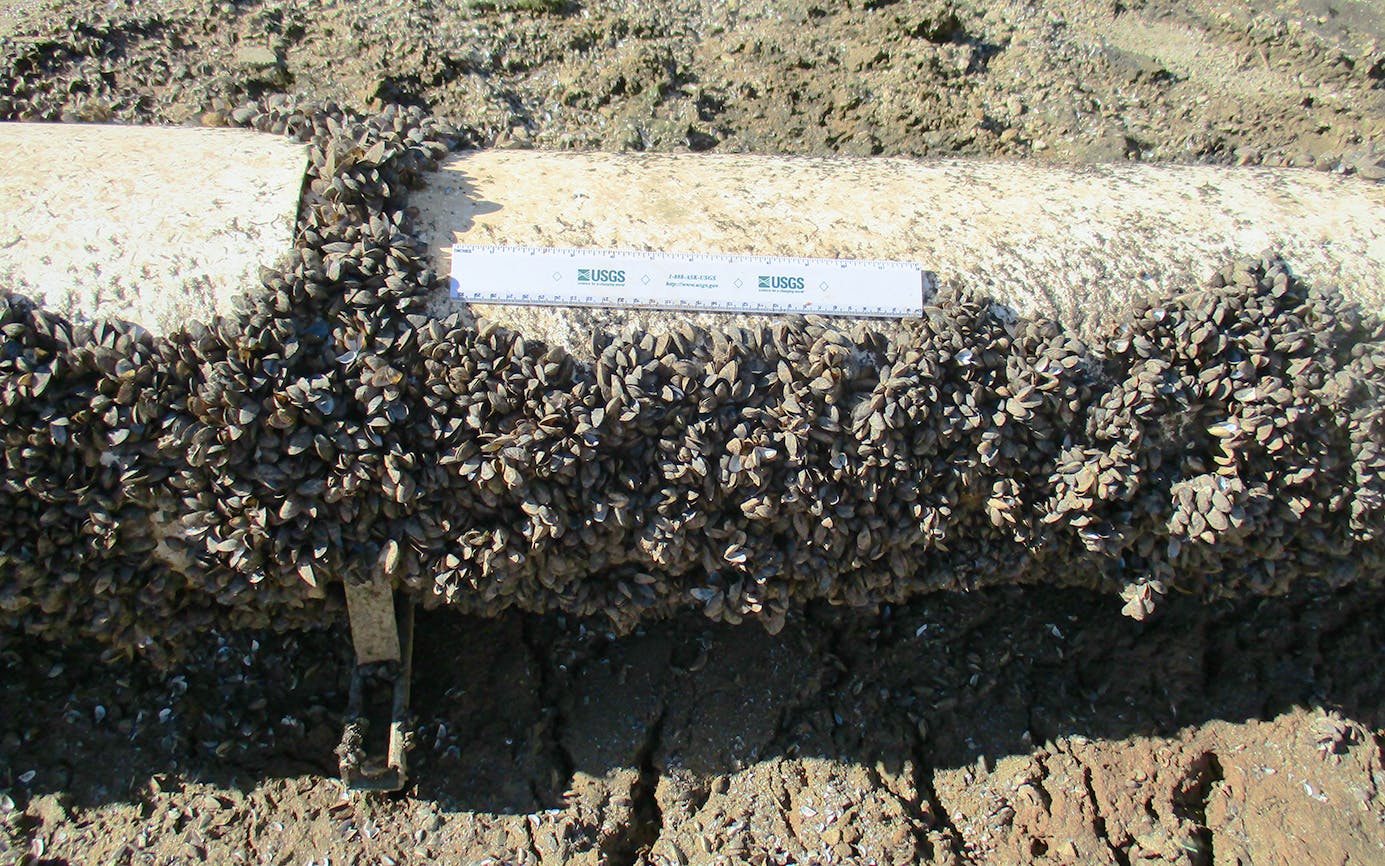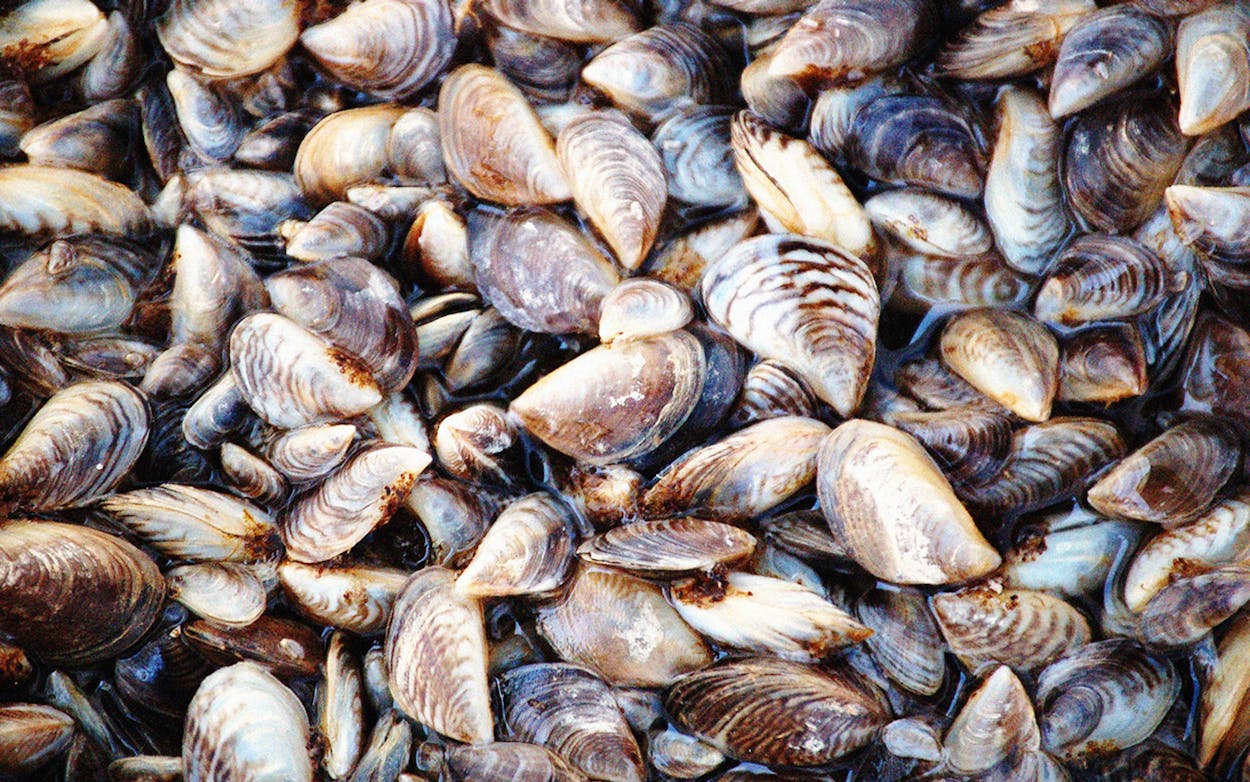The dreaded zebra mussel has struck again. Small and highly invasive, sharp-shelled and sometimes extremely stinky, these bivalve mollusks already infest much of the Highland Lakes chain along the Colorado River in and near Austin. This week brought news that they’ve been discovered farther upstream, in Lake LBJ, which they likely reached by hitching a ride.
The mussels can spread downstream on their own but only move upstream by clinging to a boat. Once they reach a body of water, there’s no getting rid of them. Their recent discovery in LBJ, as well as Lake Pflugerville, brings to seventeen the number of Texas lakes and river basins overrun by the exotic species, mostly in the central and northern portions of the state. They’ve additionally been detected in eleven waterways not yet officially classified as “infested,” including lakes Placid and McQueeney, both downstream from infested Canyon Lake on the Guadalupe River. Two of the most popular lakes in North Texas, Texoma and Ray Roberts, are likewise already infested.
So what are we supposed to do about all these unwanted invertebrates? Monica McGarrity, senior scientist for aquatic invasive species with Texas Parks & Wildlife, explains how zebra mussels got here, why they’re so destructive, and what steps we can take to contain the invasion.
Texas Monthly: First, how do you identify a zebra mussel?
Monica McGarrity: They’re small bivalves [meaning they occupy two shells hinged together], triangular in shape, and reach a maximum size of only 1.5 inches long. Their shells are dark brown and often have lighter tan stripes, but they can also be completely dark brown. If they are attached to any surface, it’s a dead giveaway that you have zebra mussels.
TM: Why are Texans so worried about them?
MM: Their economic impacts are what we fear most. In any infested lake, every facility pulling raw surface water is going to have problems. Zebra mussels can attach to any hard surface and to each other, forming large colonies called druses. Any pump drawing water can be fouled with mussels. They can completely clog a pipe up to 14 inches in diameter. Their larvae are microscopic, so they’re virtually impossible to filter out, and they cause down time for maintenance and retrofitting of facilities, as well as expensive mitigation systems like chemical injections. Zebra mussels also foul beaches with their sharp shells and attach to docks and ladders, making it easy for folks to cut themselves during a visit to the lake.
TM: Weren’t zebra mussels the culprits that got into a pipe at an Austin water treatment plant last February, forcing downtown residents to drink and take showers in water that smelled like rotten trash for a few days?
MM: That’s right. When zebra mussels die, they have the potential to cause a foul smell and taste in water systems. It can also happen along beaches when water levels drop. Those dead and decaying mussels can cause quite a stench.

TM: What about their effect on boats?
MM: They can get into any intakes, cracks, and crevices, and cause damage to hulls and motors. It’s illegal to possess or transport zebra mussels, so folks who move contaminated boats between bodies of water risk citations.
TM: What can be done to remove zebra mussels from a lake?
MM: Unfortunately, once zebra mussels get into a water body, there is currently nothing that can be done to manage them. They are prolific, they are cryptic, and they hide in every small crevice of a lake. Dewatering water bodies does not kill all of them. There are no feasible chemical controls—especially not on the scale of a lake. Prevention is the only weapon we have. That’s why it’s critical for folks moving watercrafts between lakes to take steps to prevent the mussels’ spread, Boaters should clean, drain, and dry their boats. They should also make sure to check the anchors and remove absolutely any residual water that might have zebra larvae, which are microscopic and can’t be seen. There could be hundreds of larvae in a tiny amount of water.
If a boat has been stored in infested water, it must be decontaminated to kill as many mussels as possible. That’s critical: Call Texas Parks & Wildlife at 512-389-4848 before you move the boat so the department can coordinate with you and the marina or another shop can decontaminate the boat. Our goal is not to issue citations. Our goal is to work hand in hand with boat owners to make sure everything is done to minimize the risk of transporting zebra mussels to new lakes to the absolute extent possible.
TM: What about the effect of zebra mussels on native species of fish and mollusks?
MM: Zebra mussels are filter feeders, so they compete with shad and other aquatic species that are the forage base for some of our more popular sport fish, meaning that they are affecting the ecosystem from the bottom up. Zebra mussels can also attach to native mussels, impeding their ability to move around or even open their shells. Here in Texas, we have an extremely high diversity of native mussels, but a number of them are imperiled.
TM: So where did these little beasts come from?
MM: They’re from the Black and Caspian sea regions. In their native range, they’re part of the ecosystem, and they’re not causing problems there, but they became invasive in other areas of Europe long before they were found in North America, primarily by moving through canals and on boats. They were transported to the Great Lakes in the late 1980s, either in the ballast water or on the anchors of large, oceangoing ships, and they were introduced to Texas in 2009. Originally, scientists didn’t think zebra mussels would be able to make their way to Texas because of the heat, but they have been able to adapt and expand their range much farther than ever thought possible. These are highly invasive mussels. They are only in five river basins in Texas, so they’re not everywhere, but that is still really impressive.
TM: Or terrifying.
MM: You said it.
This interview has been edited for clarity and condensed.
- More About:
- Critters








